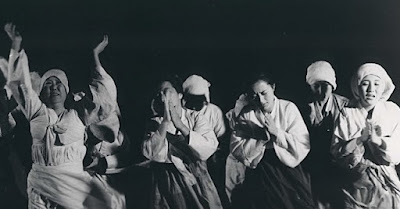
Shamefully uneducated in the Korean language, I'm fully aware that I repeatedly miss nuances in Korean films. In the award-winning Seashore Village, for instance, one English subtitle reads "It's a boy" but the actual dialogue is "It's got a penis" — something I'd have missed without my current Korean-American love interest. There's a big difference between those two statements extending way beyond mere Americanization. What other phrases got expurgated in the name of decency, I don't know. But translation gets complicated when what's acceptable becomes a shaping factor. Considering Seashore Village revolves around the sexual bond between a widow (Ko Eun-a) and her second husband (Shin Yeong-gyun), I'd hazard a guess that other frank statements have been "cleaned up" in the name of propriety. What can't be hidden, however, is the couple's explicit physical connection, something which guides much of the action — sometimes delightfully, sometimes disturbingly. (Also, inescapable is a lighthearted lesbian tryst between two minor characters who, far from reviled, are viewed as a subject of merriment by the local women.)
Shot in a fable-making black and white yet feeling incredibly contemporary, from its haircuts to its moral relativism, Kim Soo-young's 1965 classic Seashore Village feels equally archival and anticipatory, like an unintentionally modern artwork that nods to rape culture, Stockholm syndrome, gynocentric communities, shamanism, gender norms, and a back-to-nature movement as if such components were always an unavoidable part of life. And they were. And they are. With exceptional performances from its two leads, Seashore Village is concrete proof that Korea has been making world-class cinema for at least 50 years; what an invaluable service the Korean Film Archive provide us by showing us as much on YouTube!





No comments:
Post a Comment